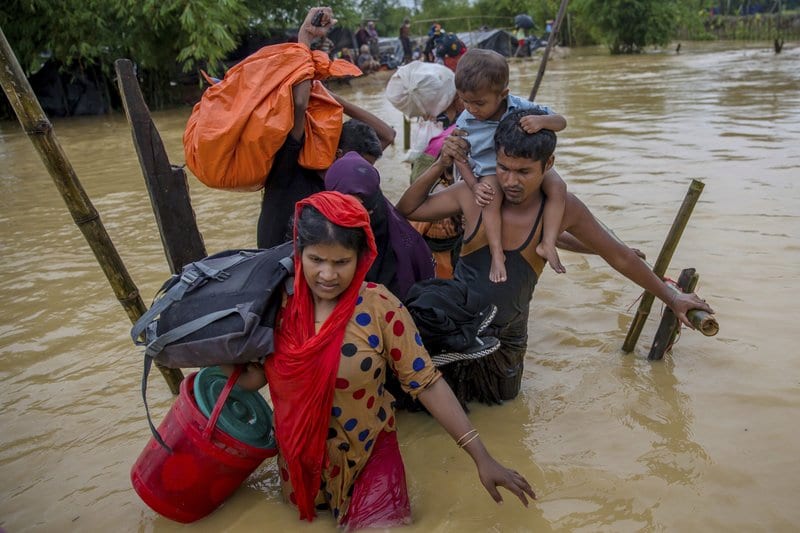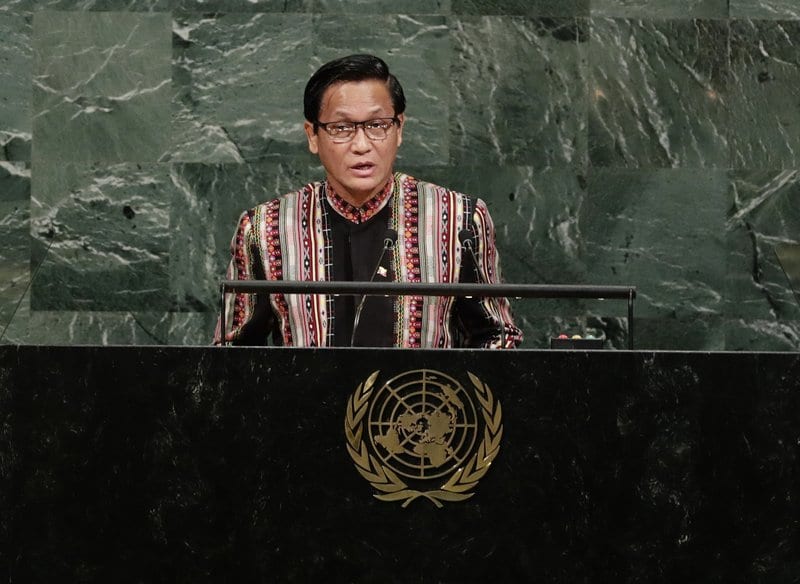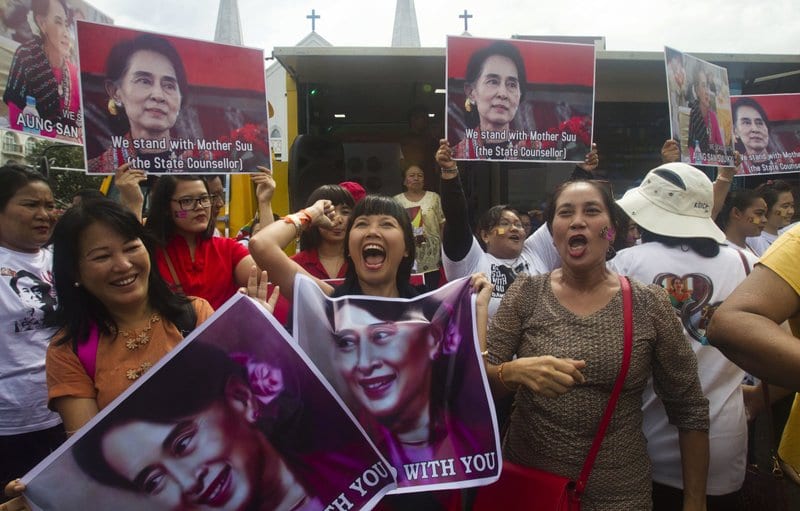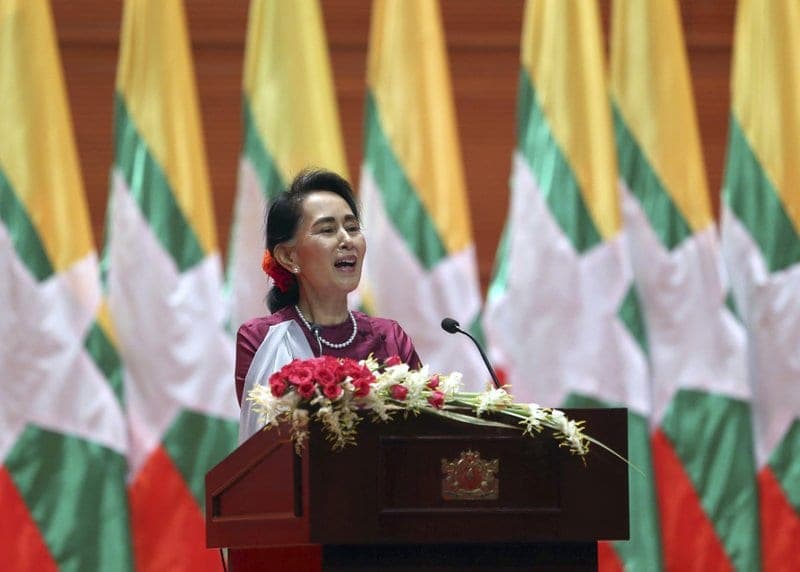MUMBAI, India – Myanmar’s first Cardinal says Aung San Suu Kyi needs the support of the international community during the ongoing crisis in Myanmar’s Rakhine State.
Cardinal Charles Maung Bo, Archbishop of Yangon, said Suu Kyi has been over criticized – “sometimes mercilessly” – by many in the international community over the actions of the military against the Muslim Rohingya population, but what she really needs are outsiders to help provide constructive solutions to the crisis.
Over the past month, nearly 500,000 Rohingya have fled Myanmar into neighboring Bangladesh, after Myanmar’s military began what it called “clearance operations” last month.
The Rohingya live mostly in Myanmar’s Rakhine State, and claim to be native to the area. There was also immigration from the neighboring areas of India, and what is now Bangladesh, during the pre-colonial and colonial era, but most families have been in the area for generations.

Rohingya have faced persecution for decades, and were denied citizenship under a nationality law passed by the government’s military regime in 1982, in which the Rohingya are officially considered “Bengali interlopers.”
The current crisis became even worse on August 25, when Rohingya insurgents attacked a police outpost.
The military then began what it called “clearance operations,” and Rohingya refugees claim this involved indiscriminate murder, arson, and forced removals.
RELATED: Bangladesh cardinal praises government response to Rohingya crisis
On Wednesday, Vice President Henry Van Thio told the U.N. General Assembly that the government is committed to ensuring aid reaches those who need it without discrimination and implementing recommendations of a commission on resolving the tensions in Rakhine State led by former U.N. chief Kofi Annan.

Suu Kyi – the Nobel Prize-winning democracy activist who now serves as “State Counselor” and leader of the ruling National League for Democracy – has been criticized for not doing enough to stem the violence.
Bo told Crux in an email that Suu Kyi is in “an awkward position politically,” because the military still controls much of the government’s apparatus, and there is no political will within the country to support the plight of the Rohingya.
“If she speaks out on such a sensitive issue, the situation will explode, making it harder for her to solve the problem in Rakhine,” said Nyman Win, an NLD executive.
“Though Aung San Suu Kyi embraced diversity by bringing in Christians and Muslims into her inner circle, the agenda of nationalists and extremist monks has been threatening to shred the social fabric especially in Rakhine state,” Bo said. “And it has happened now.”
Bo said there are two major concerns for Buddhist groups and the government: The rise of transnational insurgent groups and the demographic balance in Rakhine State.
Bo said the government is worried that the native Rakhine population – already a minority in the state – will be overwhelmed if the Rohingya are given citizenship. Before the current crisis began there were 1 million Rohingya in the state, but over 1 million were living outside the country, and there are government fears they will try to move back to Myanmar.
RELATED: Catholic Church in Asia responds to Rohingya refugee crisis
The cardinal pointed out there are also many unspoken underlying causes to the crisis, including the fact mining interests wish to exploit the region and the lack of a “truth and reconciliation” mechanism during the country’s transition to democracy, which made a convenient scapegoat useful to ease existing tensions.
In light of this, Bo said it is important to remember that even if Suu Kyi’s perceptions of the situation are incorrect, “her integrity and commitment are above suspicion.
“Her own lifetime sacrifice to resurrect from the ruins of junta misrule of sixty years is a great historic achievement,” the cardinal said. “In her fragile hands, she holds the dreams of millions of this country.”
Bo said she needs to be given more time, and as she continues in office, the military will become increasingly sidelined.
“Appreciation of her role in democratizing this nation is much needed,” he said.

The cardinal said Suu Kyi resurrected the peace process between the army and various ethnic militias, organizing two conferences to provide space for dialogue among different antagonistic parties.
Suu Kyi had also begun the process of seeking a solution to the sensitive situation in Rakhine State, before the current upsurge in violence put a stop to the process.
The cardinal said her efforts need support, and visitors should recognize the different domestic pressures she faces when they meet with her, especially when these meetings take place in Myanmar.
Bo also said the language used in such meetings is important, especially in light of Pope Francis’s planned visit to the country on November 27-30. (The pope will then visit neighboring Bangladesh from November 30 – December 2.)
RELATED: Myanmar cardinal calls for independent investigation of war crime allegations
“What is in the name? In Myanmar, it matters the most,” he explained. “The country itself has not settled down to one name. Myanmar/Burma is the international term. Myanmar was the name accepted by the military junta. The democracy activists including Aung San Suu Kyi refused to accept this term and continue to use Burma till 2010. Many western countries continue to use the term Burma.”
He said the word ‘Rohingya’ causes the same controversy.
“Rohingya is not an easy term. It is a politically charged term,” Bo said. “Not to use it will incense the Rohingya support groups. Using the word would provoke universal condemnation among the Burmese people, army, and government.”
The cardinal acknowledged the difficulty of the language situation since the term “Bengali” or even “Muslim community in Rakhine state” is not accepted by the Rohingya themselves.
Bo said the use of the term in Myanmar is unnecessarily provocative when visiting Myanmar, and counterproductive to coming to a solution for the crisis.
The cardinal said the upcoming visit by the pope is being welcomed as a blessing for “peace and harmony” by the government.
“For any observer, both the civil government led by Aung San Suu Kyi and the military seem to be enthusiastic about the visit,” he said.
Bo suggests during the papal trip, focus should be on making sure there is access for humanitarian aid, and working for a “durable” and “non-violent” solution. He also said other affected groups in the country should not be forgotten.
There are around 450,000 Catholics in Burma, less than 1 percent of the total 53 million.
Bo said Christians were involved in a struggle for their rights during the sixty years of military rule, and many are disappointed that Francis has mentioned the Rohingya three times, but has never mentioned the situation involving the predominantly-Christian Kachin or Karen ethnic minorities.
“They are also not happy that there is no official meeting with the pope of the ethnic groups,” he added. “This is a sensitive issue.”















